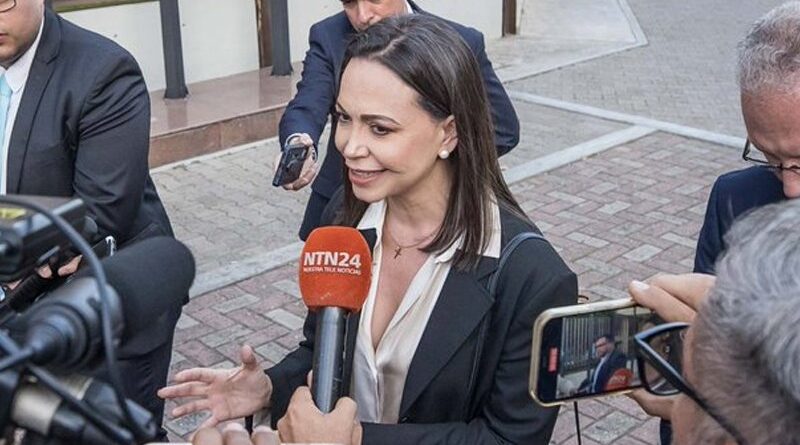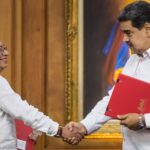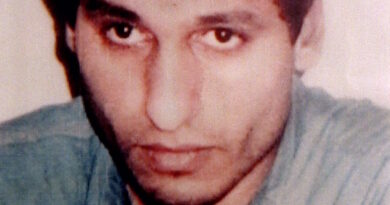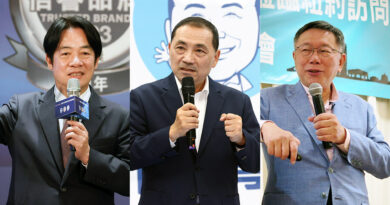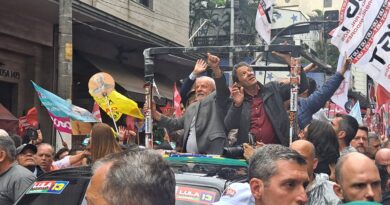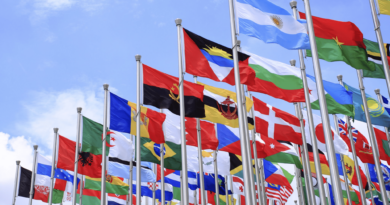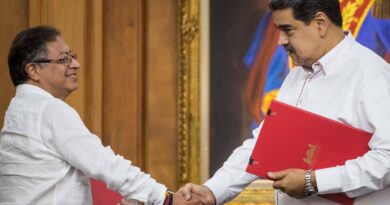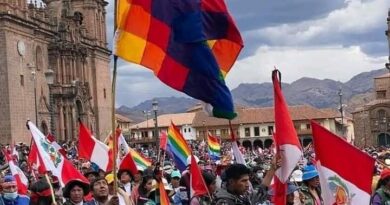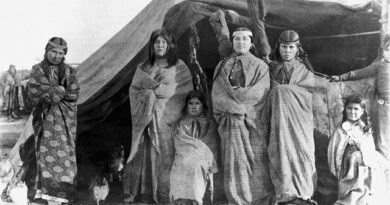Will Machado be able to repeat the Milei phenomenon?
2023 concluded with a series of unknowns to clear up for the winner of the opposition primaries in Venezuela
CLODOVALDO HERNANDEZ
When the deadline to do so was almost going to expire, on Friday, December 15 at 4 in the afternoon, the Venezuelan radical opposition leader María Corina Machado appeared before the Supreme Court of Justice (TSJ) to request that the disqualification that she dictated to him, several years ago, by the Comptroller General of the Republic and which prevents him from holding public office.
When making that request before the highest body of the Judiciary, Machado contradicted himself in central points of his explosive speech, according to which the government of Nicolás Maduro is a fierce dictatorship that controls all public powers, which, therefore, are illegitimate. .
She also recognized the validity of the disqualification, after repeatedly denying it, alleging that she was never notified of said measure.
Now, the possibility of participating in the race for the presidency of the Republic in 2024 depends on the justices of the high court. And there is at stake his option to be “the Venezuelan Milei”, as they have begun to tell him, that is, that he can confront a progressive government with the nebulous, but seductive ideas of ultraliberalism, paleocapitalism and right-wing populism.
The possibility of resorting to the Supreme Court to review the disqualifications of candidates was included in a roadmap, the result of the Barbados Agreements, signed by representatives of the government and the opposition.
Yes but no
Machado had repeatedly assured that he would not appear before the TSJ, as he considers himself empowered by the more than two million people who, according to his figures, gave him support in the primaries of a sector of anti-Chavismo, held in October and which he won with 93%. of the votes. However, she did appear before the highest court and then had to resort to rhetorical pirouettes to explain this discrepancy between what was said and what was done.
It is not a new behavior in her or in the spectrum of the Venezuelan opposition. These dissonances have been its main characteristic since it appeared among the signatories of Pedro Carmona Estanga's decree, after the coup d'état that overthrew Chávez for just 47 hours. She emphatically denies that she signed that document (which was unknown to all the public powers elected in 2000) and assures that it was only an attendance list.
Machado has been the protagonist in all attempts to violently take power, although now he claims to be a staunch supporter of the electoral confrontation with Chavismo. She was the standard bearer in the request for a foreign military invasion through the obsolete Inter-American Treaty of Reciprocal Assistance (TIAR) and for years requested to radicalize the blockade and unilateral coercive measures against Venezuela, as a formula to remove Maduro from power.
The disqualification that weighs on her is an administrative measure contemplated in the Organic Law of the Comptroller General of the Republic, which has also affected other former public officials, including high-ranking opposition leaders such as the two-time former presidential candidate Henrique Capriles Radonski. In her case, it was applied after Machado, being a member of the National Assembly, in 2014, agreed to be an ambassador. and following the best practices of Panama before the Organization of American States (OAS), without requesting permission from the Legislative Branch.
This maneuver was carried out with the aim of Venezuela being represented in the OAS by a spokesperson for the radical opposition, to complete the siege that had been established against the Venezuelan government on international stages.
Orders from above?
Machado, belonging to a family of the most traditional Venezuelan oligarchy, does not hide his affiliation with the United States and his willingness to put the country back on the track of superpower, if he reaches the head of state.
Shortly before his visit to the Supreme Court, a group of US congressmen, led by ultra-conservative Republican Rick Scott, asked Joe Biden's government to officially recognize Machado as the new leader of the Venezuelan opposition, following the result of the primaries. She thanked the gesture with a video broadcast on social networks, in a gesture that clearly indicates that, according to her point of view, if “Washington locuta, finite cause”, as the Latin phrase referring to Rome and, specifically, the Vatican says.
In his last-minute move before the TSJ, this subordination to imperial dictates is also evident. As stated before, Machado had sworn that she would not go before the TSJ because she believed it to be illegitimate and because she did not consider herself disqualified. But, it happened that the United States ambassador to Venezuela (based in Colombia), Francisco Palmieri, sent a message, in English, through social networks, applauding the anti-Chavista leader for having gone to the Venezuelan highest court, when this was still It hadn't happened. And, immediately afterwards, she appeared on the scene, boasting that she had put the government in check by using the element of surprise.
In the light of many Venezuelan observers, Palmieri's action was not a congratulation, but rather an order issued publicly. If she had maintained her position of ignoring the TSJ, she would have disobeyed a direct instruction from the north and, in the process, would have left Palmieri in a bad light.
The leader and those close to her have turned what happened around, presenting it as a harbinger of victory. They assure that it is a mere procedure before the judicial body, since the rehabilitation would have already been agreed upon, imposed by the United States in exchange for relief from sanctions and the blockade.
How is 2024 coming?
Machado's objective was that, after having been decisively elected in the October primaries, she could establish herself as the only opposition candidate in the face of Maduro's re-election option.
But, the dynamic and changing global and local reality has disrupted that plan. Several events that occurred after the primaries have taken away the power of that consultation, in which eight other candidates participated (from an original list of 14). The complaints made by other opposition factors and the investigations by the Public Ministry have called into question the veracity of the results of that process, carried out manually, without supervision of the National Electoral Council and completely unauditable, since the electoral materials were destroyed hours after the process.
A second issue that has affected Machado is his position on the issue of the consultative referendum on Guayana Esequiba, apparently closer to that of Guyana than to that of Venezuela. Both from the government and from opposition parties adverse to the leader, her conduct has been denounced as contrary to national interests and the result of alleged financing by ExxonMobil, the American company that is exploiting crude oil in undefined marine areas. Guyana and Venezuela, through “concessions” issued by Georgetown.
This accumulation of questions, which aim to accuse her of the crime of treason, could affect the sentence issued by the TSJ, even though it is assumed that the high court is only going to judge the legitimacy or otherwise of the disqualification issued by the Comptroller's Office.
Some commentators indicate that Machado runs the risk of leaving in an even worse situation than that derived from her disqualification, since the Supreme Court could well decide that there are merits to prosecute her for the aforementioned crimes of treason. Or, in any case, a ratifying ruling would give judicial status to what until now was an administrative sanction.
Candidates flourish
The idea of Machado as the sole opposition candidate also comes up against the internal movements of this political sector, which is quite fragmented and without centralized direction.
Several opposition candidacies have been flourishing, regardless of the leaders who participated in the primaries. Characters from various segments of the opposition will be participating in the presidential race, without Machado having much chance of joining them, due to his intolerance, egocentrism and radicalism.
Alternative candidates include:
- The comedian and businessman Benjamín Rausseo, known as “the Count of Guácharo”, who refused to go to the primaries and went into a kind of hibernation state, from which it is not known whether he will emerge or not in 2024.
- The former president of the National Assembly José Brito, from the right-wing Primero Justicia party, was a key player in bringing the issue of Machado's disqualification to the fore.
- The leader of the Pencil Alliance movement, Antonio Ecarri, a former militant of several opposition parties, who is presenting himself as an independent option.
- The former governor of the eastern state of Monagas Luis Eduardo Martínez, for one of the factions of Democratic Action, the party that dominated Venezuelan politics during the second half of the 20th century and was displaced from that hegemonic position by Chavismo.
- The former general secretary of the Movement Towards Socialism party (moderate left) and journalist Manuel Isidro Molina.
- Chavismo dissident María Alejandra Díaz, who hopes to receive support from hard-left sectors dissatisfied with Maduro's policies.
The scenarios for Machado
Depending on the decision made by the Supreme Court, the scenarios change for Machado and for the opposition in general.
If the TSJ annuls the disqualification, Machado will be able to register in the 2024 electoral competition (which does not yet have a precise date) and measure the true dimension of his leadership against Maduro. It is in this scenario where she could develop a profile similar to that of Javier Milei in Argentina, as a disruptive option with a speech that charms the popular majorities and leads them to vote for a basically anti-popular program.
Naturally, this possibility will largely depend on how the Milei government develops in 2024, as it could be its best or worst propaganda.
If the TSJ ratifies the disqualification, she and those who direct and advise her will have to choose between calling for abstention; designate a delegate candidate so that people vote indirectly for her; or resort to street violence again, as happened in 2014 and 2017.
The list of possible anointed by Machado includes several of those who competed in the primaries, as well as the head of the opposition delegation in the dialogues with the government, the lawyer Gerardo Blyde and even the magnate of Empresas Polar (food, soft drinks and beer ), Lorenzo Mendoza, who is always mentioned as outsider.
Among the opposition leaders there are several who are waiting for the result of the judicial process to show their cards. Obviously, some of the alternative candidates hope that Machado remains out of the game, since that would give them greater chances of obtaining a good vote, perhaps not to win the presidency, but to be well positioned, facing the parliamentary, regional and local 2025.
There are several questions that remain pending, at the end of 2023, regarding Machado and everything she means for the Venezuelan opposition. The political bets are open.

